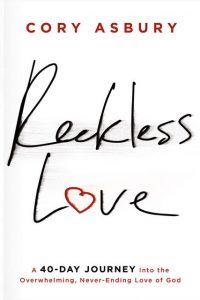CCM Exclusive: Book Excerpt
Reckless Love: A 40-Day Journey Into the Overwhelming, Never-Ending Love of God
by Cory Asbury — Charisma House (Release date: January 7, 2020)
Based on the #1 Hit Single “Reckless Love”
 Is God’s love reckless?
Is God’s love reckless?
In this forty-day journey, “Reckless Love” songwriter Cory Asbury dives deep into the heart of the popular worship song as he shares the stories behind the song and explores the themes that have resonated so powerfully with listeners, including the following:
• How to walk in true sonship
• Why we never earn or deserve the Father’s love
• How to see God’s goodness even amid trials and pain
• Whether God’s love is every truly reckless
***** Adapted Excerpt *****
A Year After the Controversy, Cory Asbury Pens Book About God’s Reckless Love—By Cory Asbury
Cory Asbury’s worship song “Reckless Love” became the number one single on Billboard’s Hot Christian Songs chart in 2018 and was named both Song of the Year and Worship Song of the Year at the 2018 GMA Dove Awards. In 2019 it was nominated for a Grammy. But with its success came controversy which Asbury addresses in his new devotional Reckless Love.
I’ve been asked countless times how and why I would choose to use a word like reckless to describe the love of God. Some “critics” have been gracious, and some have been less than gracious (to put it lightly). While I understand that my choice of words is undoubtedly bold, I believe in a God whose love is infinitely beyond the bounds of our English Rolodex of descriptors, a God who lives so far outside the confines of human language that words fail to describe even the edges of His complexity.
At the height of the controversy surrounding the song in 2018, it seemed as if its opponents made it their goal to disprove the idea of God’s reckless love. I can’t tell you how many internet blogs, news articles, and social media posts tagged me in their publications. Looking at it in retrospect, I believe most people who took offense at the word fall into two main camps. (I’m sure there are other groups with considerably more nuance, but these two are the biggies.)
People in the first camp hold the notion that nothing can happen outside God’s foreknowledge (since He’s omniscient); therefore, none of His actions could ever be deemed reckless. These people would call Jesus’ death on the cross “calculated” and “intentional.” I would offer this rebuttal: Jesus knew that Lazarus would rise again in John 11, yet He still wept for Him. Why? Because omniscience (or precognition) doesn’t negate the pain of the foreseen event. In other words, just because you know something painful is going to happen in the future doesn’t mean it’s not going to hurt when it does.
We must remember, Jesus was fully God and fully man, which means, like us, He carried the capacity for deep emotion—empathy, sadness, sorrow, and suffering. Describing the cross as calculated because it was always part of His plan doesn’t make it any less grueling. It would be like knowing you are going to the dentist tomorrow to get a root canal—without anesthesia. Just because you’ve got it on the calendar doesn’t mean it’s not going to hurt like crazy. So while the adjectives calculated and intentional are certainly true of our Savior’s work at Calvary, they don’t intrinsically preclude the application of the word reckless. In other words, someone could be “intentionally reckless.” Allow me to illustrate this idea in two analogies.
In the first, a father named Richard plans to surprise his son, Jesse, with the gift of a lifetime: a brand-new car for his sixteenth birthday. For the sake of making this illustration more relatable (and more dramatic), let’s say this car is a red Lamborghini Aventador S. This model retails for almost half a million dollars, but hey, Richard really loves his son, you know?
At first glance, do you as an outside observer think it is wise of Richard to give his son such an expensive vehicle at such a young age? Do you think it’s a sensible thing to do?
I suggest that, in light of what we know about the general temperament of most teenagers, it is not sensible. Plus, the latest data tells us the leading cause of teen death is accidental injuries, such as car-crash injuries. Perhaps the 740-horsepower engine of the Lamborghini might tempt Jesse to drive a little faster than the speed limit one night. What if he gets careless with his friends and loses his life in a tragic accident? Was the car a wasted gift? Was it just a foolish gesture? Again, I’d like to suggest that it was not.
You see, God doesn’t give gifts according to our ability to steward them perfectly or on our worthiness to receive them. Neither did the father in this story. God gives according to one criterion—His ridiculous kindness. He hands out good gifts left and right like it is Christmas morning all year round because it’s just who He is. It’s His nature; He cannot be any other way. His character is overflow. There’s no caution in His kindness; there’s only lavishness.
Our second illustration examines one of God’s greatest gifts to humanity: the gift of children. In this scenario, a newly married young couple, James and Rachel, just found out they’re pregnant with their first child—a little boy. Sadly, James isn’t as excited as he should be at the news. You see, he was sexually abused as a child and still hasn’t found the courage to tell his wife. The shame of his prior experience clouds his ability to feel the hope and joy that should accompany such a mountaintop moment. He’s scared, and rightly so. Bringing a child into this world is a weighty thing. James worries that he’s going to fall into the unfortunate patterns of his childhood and end up hurting his son.
Now let’s ponder something. Is it foolish for God to allow James—a broken, sinful human being with a less-than-perfect past—to bring a child into this world? Probably. I mean, if anyone is acquainted with humanity’s propensity for darkness, it’s Almighty God. Yet He affords James the gift of a child anyway because He’s just that good.
Is there not a strong possibility that James might affect the life of his little boy in a negative way? Absolutely. But what if God in His infinite wisdom knows this is a divine opportunity for healing and redemption? What if God knows this is where the power of the cross can purify James’ past and send his shame packing once and for all? What if becoming a dad could somehow heal the scars of his childhood? Did God think through the vast number of outcomes for this father-son relationship? Has He predestined it or does James have a choice in the matter?
I believe James has a choice, and his choice is the canvas on which to display his gratitude for God’s “foolish” gift, His intentionally reckless display of love. Therein lies the beauty of the entire equation of life: God lets us choose how we’ll respond to His preposterous mercy, to His scandalous grace. Almost overlooked amid all the trappings of the Father’s generosity, our free will might be the greatest and most reckless gift of all.
This leads to our second camp of opponents: those who say God’s love can’t be reckless because their associations with the word reckless are negative. In other words, since the word typically carries negative connotations, it can’t be ascribed to God because He’s altogether positive. Consider this: Scripture says that God is a jealous God; yet “Thou shalt not covet” (Ex. 10:17, KJV) is one of the Ten Commandments. How can this “paradox” be? The answer is, word association does not equal word definition. Preconceived notions of a word—positive or negative—do not determine that word’s function or meaning.
The idea that God could be reckless in His pursuit of humanity also threw many people off. They felt it implied that He needed our affection in return (and obviously the God who has everything doesn’t need anything). In their estimation, this notion painted God as weak, whiny, whimpering, and love-scorned. It made Him look needy, and most Christians (especially those only outwardly familiar with the Jesus of the Bible) prickle at this notion, because to them, God is only ever big, strong, and barrel-chested. But God—yes, the same God who created heaven and earth—gives Himself away in desperate hopes that we’ll return His love. He is that vulnerable and humble, and His heart is that tender.
It’s not weakness as many misperceive. God’s longing to be loved isn’t a suspension of His power; it’s evidence of the incomprehensible fury of His love. A. W. Tozer says it like this, “[God] waits to be wanted.” He’s not a sad schoolgirl wallowing like a wallflower at the high school dance; He’s a Father, fierce in love, coming after His sons and daughters with reckless abandon.
To support the second camp’s position that a negative word can’t characterize God, a lot of articles and blog posts cited synonyms for reckless in an attempt to discredit the song. They cherry-picked the words that served their purpose while neglecting the others. The inexactness of this logic is quite shocking. It reminds me of arguments I often see on social media (usually between Christians and non-Christians), in which the debaters pick and choose which scriptures they want to use as ammunition for their empty squabbles, regardless of the actual context of the verses.
Overall, our vocabulary is too limited to describe an ineffable God, a mysterious God who lives outside of time and space. The God who created the cosmos and its languages cannot be contained within their constructs. We seek words that fall infinitely short of the Creator of the universe. God is too wonderful for prose, too beautiful for poetry, and too brilliant for love songs. He is altogether indescribable. Lifetimes could be wasted trying to create something worthy of His incomparable splendor.
Yet as writers and artists, we still have a responsibility to make Him known, both as descriptively and as precisely as possible. Our language is too feeble, yet we must try.
This is an adapted excerpt from Reckless Love: A 40-Day Journey Into the Overwhelming, Never-Ending Love of God by Cory Asbury. Copyright ©2020 Published by Charisma House. Used by permission.

 Listen Live
Listen Live
Leave a Reply
You must be logged in to post a comment.